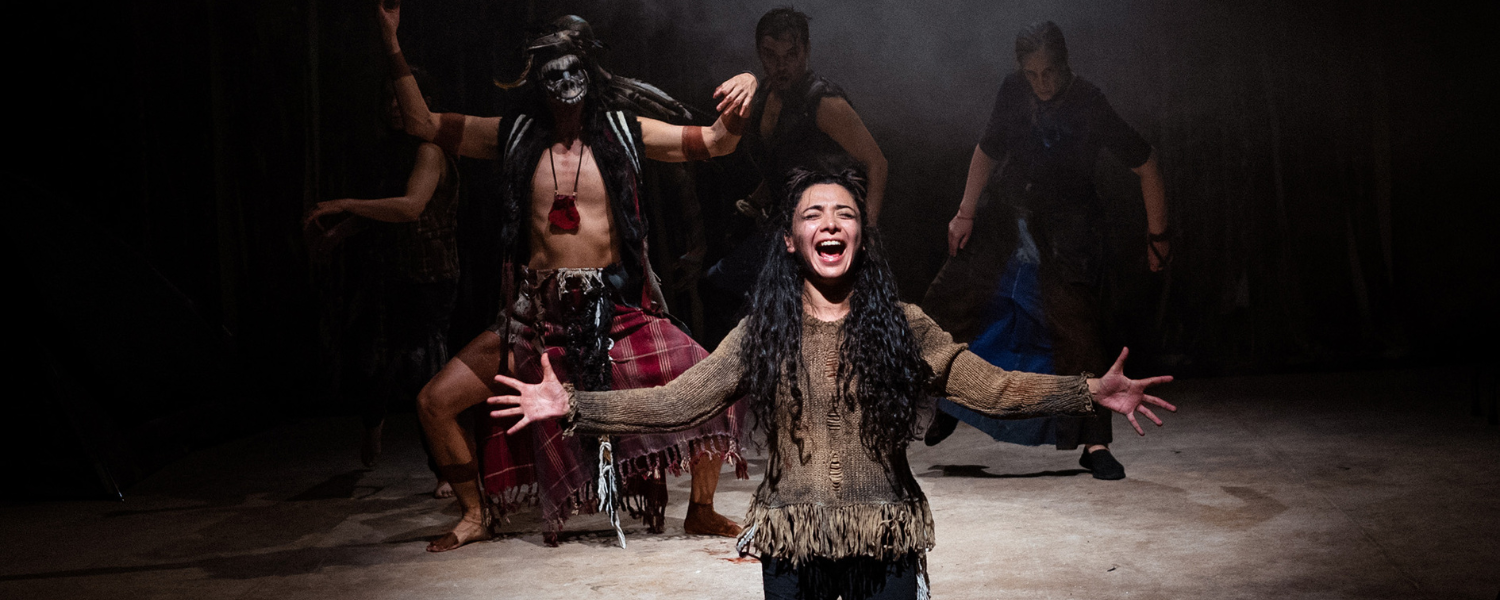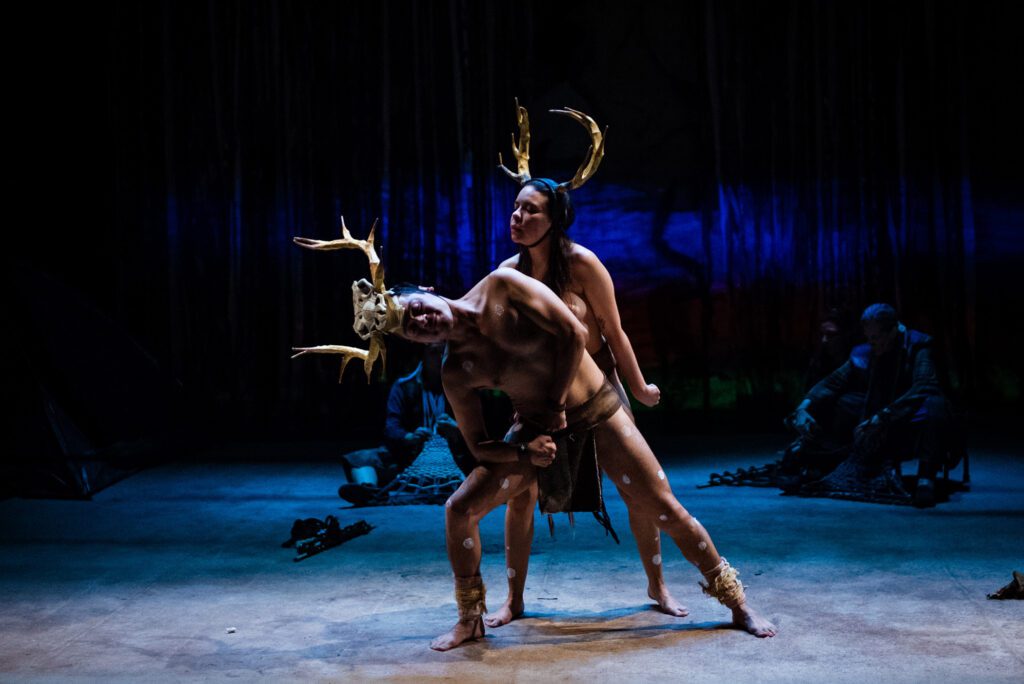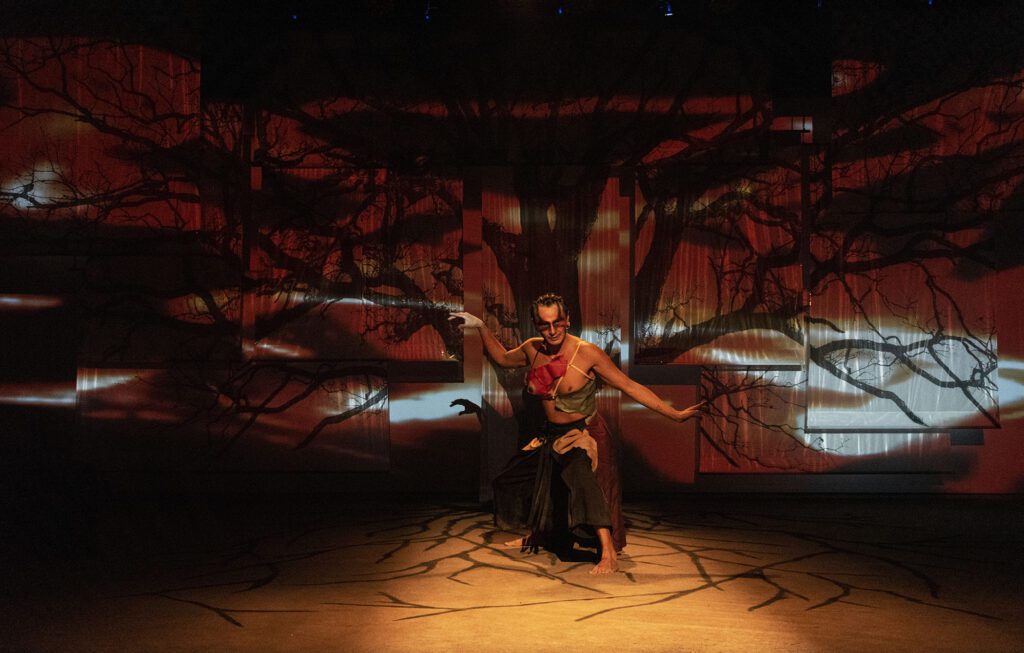Review – Pueblo Espíritu

Pueblo Espíritu devised by Organización Secreta Teatro
Reviewed by Amanda L. Andrei
Clutching their face masks and backpacks, four exhausted individuals stumble into a strange forest. Nerves clearly shot, they spray disinfectant at each other and come to blows, but not before a fifth person appears, coughing so hard that they fall to the ground. In the ensuing silence and weight of paranoia, the individuals surrender to their fatigue—and to the spirits of the surrounding land.
So starts Pueblo Espíritu (“Spirit Town”), a wordless multimedia performance devised by Mexico City’s experimental Organización Secreta Teatro and directed by company founder Rocío Carrillo. Wordless, yet carried by character grunts and overhead music swelling with drums and chants, the ensemble (Beatriz Cabrera, Alejandro Joan Carmarena, Brisei Guerrero, Stefanie Izquierdo, Ernesto Lecuona, Mercedes Olea, and Jonathan Ramos) remake their post-apocalyptic environment by communing with the wildness of the spiritual world and returning to embodied material-making practices, such as weaving and ceremonial medicine.

There’s still peril in the spiritual world, though, and tension between physical, social, and spiritual boundaries explored more through dream logic than by way of any definitive storyline. A gloriously painted bird-entity (Carmarena) seems to have power over the dead, but is also susceptible to the tricks of a feral girl (Izquierdo) who appears to be negotiating her status as human, animal, and warrior.
A medicine man (Ramos) leads the group in a ceremony where a fierce feminine divinity arises and dances amidst dangerous laughter (Guerrero), while afterwards an archer and hunter (Lecuona) deals with a terrifying apparition and deer-like spirit (Cabrera) in what could be a nightmare or the birth of something more sinister.
An elderly woman (Olea) observes and absorbs much of this pain, sometimes serving as a guide and other times as a witness.
Carrillo’s direction steers the ensemble between swift dances, tender embraces, and erotic animalistic movements to portray the porous interdimensionality of the worlds. Erika Gomez’s design conjures up a lavish natural world, yet one still marred by civilization and prone to interruption. The mask and makeup elements are particularly inspired and detailed, turning ordinary humans into supernatural creatures in mere moments.
If I could change one thing about the production, I would wish for better audio quality or live performance of the music. While the melodies are epic and reminiscent of traditional indigenous songs, the overheard sound and its slightly tinny quality could be distracting, and moments of the actors lip-synching or chanting along with the soundtrack lent me a slight feeling of uncanny disembodiment, a friction between the digital and the live performance clashing with my visual and aural senses in a way that took me outside of this otherwise enchantingly bewildering world.
However, this friction made silences onstage and any subsequent ensemble noises (sans sound) even more poignant and profound, as the echoes faded and wrapped the audience within a reverent stillness.
While Pueblo Espíritu has a limited run at the Latino Theater Company with only five performances until May 7, the ensemble will also be performing Las Diosas Subterráneas (“Subterranean Goddesses”), an experimental adaptation of the Greek myth of Persephone (the maiden goddess kidnapped by the god of the underworld) juxtaposed with the story of Luz García, a character based on real-life women kidnapped by human traffickers.
With these two stories intertwining, the ensemble seeks to portray the story of mothers looking for their missing daughters while finding strength in community. With these two performances, Organización Secreta Teatro gives us an entryway into vigorously magical worlds, inviting us to examine our own relationships with spirit, land, and power.

Pueblo Espíritu had five performances, concluding on May 7.
Las Diosas Subterráneas performs the following week, on Wednesday, May 10 at 8 p.m.; Thursday, May 11 at 8 p.m.; Friday, May 12 at 8 p.m.; Saturday, May 13 at 8 p.m.; and Sunday, May 14 at 4 p.m.
Tickets range from $22–$48, except opening night (May 3), which is $58 and includes pre- and post-show receptions. The Los Angeles Theatre Center is located at 514 S. Spring St., Los Angeles, CA 90013. Parking is available for $8 with box office validation at Joe’s Parking structure, 530 S. Spring St. (immediately south of the theater).For more information and to purchase tickets, call (213) 489-0994 or go to www.latinotheaterco.org
Pueblo Espíritu photos by Ángela Chapa
Las Diosas Subterráneas photo by Erika Gómez

Ioana Bîrjan (b.1997) is the author of Vârsta Iubirii which translates into English as The Age of Love (Heyday Books, 2023). The novel is inspired by the Lady of the Camellias and the opera La traviata. She earned a bachelor’s degree from the Faculty of Letters, Ovidius University of Constanța, where she is now a graduate student in the Romanian Studies program.
Read more of her work in magazines, in anthologies, and on her blog: https://scrierileioanei.wordpress.com/
SUPPORT SEEFEST
Not a member yet? Become an art patron with other SEEfest arthouse aficionados in support of great events and programs. Our mission is to keep you informed about initiatives from our wide network of fellow cultural organizations.
We Welcome YOU!

